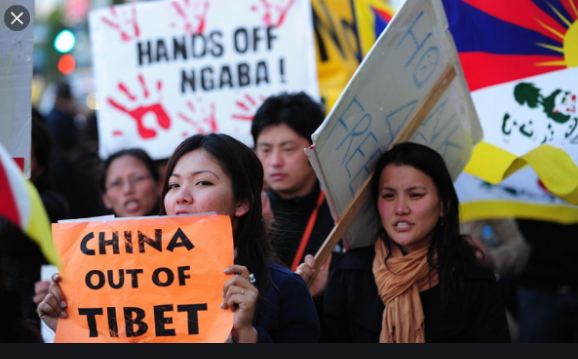Virendra Pandit
New Delhi: Increasingly isolated globally on various counts, dozens of countries, including the West, pilloried authoritarian China at the United Nations on Tuesday, criticized Beijing on different issues including its dubious role in the spread of the Covid-19 pandemic, and brutal suppression of human rights in Xinjiang, Tibet, and Hong Kong.
In particular, Western diplomats condemned China for its human rights abuses against ethnic Uighur Muslims and its crackdown on Hong Kong’s autonomy, prompting Beijing to hit back on the United States.
“We call on China to respect human rights, particularly the rights of persons belonging to religious and ethnic minorities, especially in Xinjiang and Tibet,” German Ambassador Christoph Heusgen said on behalf of 39 countries at the U.N committee on human rights issues.
In the north-western province of Xinjiang, China has detained nearly a million Uighur Muslims in so-called “re-education” camps in recent years.
He expressed grave concern about the increasing number of reports of gross human rights violations in the restive province.
“There are severe restrictions on freedom of religion or belief and the freedoms of movement, association, and expression as well as on Uighur culture,” said Heusgen. “Widespread surveillance disproportionately continues to target Uighurs and other minorities, and more reports are emerging of forced labor and forced birth control, including sterilization.”
After the meeting, Heusgen, while talking to reporters, called on China to close the detention camps.
He noted that 23 countries had, in 2019, condemned China on the Uighur issue. The near doubling of countries this year signaled that there is growing international concern about Beijing’s policy toward the ethnic minority.
British envoy Jonathan Allen said that China must grant U.N. High Commissioner for Human Rights Michelle Bachelet’s long-standing request to visit Xinjiang to see the situation of the Uighurs.
Allen also condemned the June 30 Chinese imposition of a controversial security law that he said: “violates Hong Kong’s autonomy, and threatens rights and freedoms.” The imposition of the law triggered several months of anti-government protests in Hong Kong.
An angry Chinese ambassador to the UN Zhang Jun hit back, targeting the USA, without addressing the Uighur issue. He claimed that China’s human rights achievements are “widely recognized” as he urged Washington to “take a good look in the mirror” and eliminate racial discrimination in its own society before attacking other countries.
“Millions of Americans have cried out ‘I can’t breathe’ and ‘Black lives matter,'” he said, referring to the recent calls of protesters in the U.S. demanding an end to decades of racial discrimination and injustice in the aftermath of the death in police custody of an African-American man, George Floyd, in May 2020.
Zhang also condemned US President Donald Trump’s repeated accusations that the Covid-19 pandemic originated in China and that Beijing is responsible for its global spread.
“What the U.S. government needs is treating the sick and saving lives, not spreading the political virus and making troubles everywhere,” the Chinese envoy said.
China received support from many countries, including Iran, North Korea, Syria, and Venezuela, for its authority over Hong Kong, while some 45 countries signed on to a statement delivered by Cuba, supporting Beijing’s assertion that its measures in Xinjiang are part of counter-terrorism and de-radicalization efforts.
Media reports quoting diplomats said some other countries, including Western ones, were pressured by China not to support the statement of the group of 39 nations.
The US did not speak at the session but was part of the joint statement of 39 countries that Germany delivered.
U.S. envoy Kelly Craft tweeted out her concern, saying, “The situation in Xinjiang & recent developments in Hong Kong make clear that the People’s Republic of China (PRC) has outright contempt for its human rights obligations & the well-being of its citizens.”
Human Rights Watch said the statement by the 39 countries is a “stinging rebuke” of China’s “brutal treatment of Uighurs, the people of Hong Kong and Tibet, and many ordinary Chinese struggling to have their human rights respected.”
“Their growing outrage signals the urgent need for the U.N. leadership to create an international mechanism to monitor and report on the increasingly dire rights situation across China,” U.N. Director Louis Charbonneau said.
Heusgen urged China to allow UN rights observers “immediate, meaningful and unfettered access” to Xinjiang.
Among the 39 countries signing the declaration were most of the EU member states, as well as Canada, Haiti, Honduras, Australia, and New Zealand.
It also mentioned rights abuses in Tibet.
Human Rights Watch noted that more countries had signed onto this year’s declaration “despite China’s persistent threats and intimidation tactics against those who speak out.”
Zhang Jun, refuted the allegations as “groundless”, adding the declaration is aimed at “provoking confrontation” among UN member states.
Pakistan led another statement on Hong Kong in support of China.
“China’s support list reads like a virtual Who’s Who of leading rights abusers including Russia, Syria, and Venezuela,” Human Rights Watch’s Charbonneau said.
Last month, the Australian Strategic Policy Institute (ASPI) had said it had identified more than 380 “suspected detention facilities” in the Xinjiang region.
In the US, the House of Representatives passed a bill at the end of September that aims to ban imports from Xinjiang, contending that abuses of the Uighur people are so widespread that all goods from the region should be considered made with slave labor. Earlier, it had blacklisted a number of Chinese companies in connection with their activities in Xinjiang.

